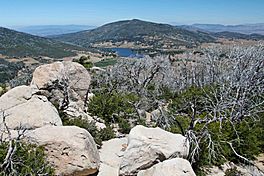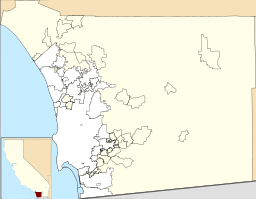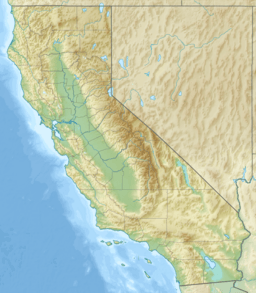Lake Cuyamaca facts for kids
Quick facts for kids Lake Cuyamaca |
|
|---|---|

Lake Cuyamaca, seen from Stonewall Peak
|
|
| Location | Cuyamaca Mountains, San Diego County, California |
| Coordinates | 32°59′11″N 116°34′50″W / 32.98639°N 116.58056°W |
| Type | Reservoir |
| Basin countries | United States |
| Built | 1888 |
| Surface area | 110 acres (45 ha) |
| Surface elevation | 4,613 feet (1,406 m) |
Lake Cuyamaca, also known as Cuyamaca Lake, is a beautiful spot in the Cuyamaca Mountains of San Diego County, California. It's a large lake, about 110 acres big, and it's actually a special type of lake called a reservoir. This means it's a man-made lake built to store water. It's also a popular place for fun outdoor activities!
Contents
Where is Lake Cuyamaca?
Lake Cuyamaca is located in the eastern part of San Diego County. It's surrounded by the Cuyamaca Mountains, which are part of a larger mountain range.
Getting to the Lake
A road called California State Route 79 goes all around three sides of the lake. This road helps people get to the lake easily. You can drive from Julian to the north or from I-8 to the south.
Nearby Parks and Trails
The lake is only about 2 miles (3.2 km) north of the Paso Picacho Campground. This campground is part of Cuyamaca Rancho State Park. Many hiking trails start from there, leading to exciting adventures in nature.
Fun Things to Do at Lake Cuyamaca
Lake Cuyamaca is a fantastic place for outdoor fun! It's managed by the Lake Cuyamaca Recreation and Park District and the Helix Water District. There are lots of activities for everyone to enjoy.
Boating and Fishing Adventures
You can go boating on the lake, and it's a very popular spot for fishing. The lake is filled with over 38,000 pounds of trout every year! It's the only lake in San Diego where you can catch trout all year long. Besides trout, you might also catch Florida bass, smallmouth bass, channel catfish, crappie, bluegill, and even sturgeon.
Relaxing and Exploring
If you love nature, you can go picnicking by the water or enjoy birdwatching. There are also hiking trails nearby. If you want to stay longer, you can rent a cabin or go camping.
On-Site Facilities
The lake area has a store where you can buy supplies. There's also a restaurant and a pub for food and drinks. If you're going fishing, you'll find a tackle shop. You can also rent boats right at the lake.
Hiking to Mountain Peaks
Around the lake, you'll see some cool mountains. Conical Middle Peak is to the east, and North Peak is to the north. You can even hike to the top of Cuyamaca Peak, which is southwest of the lake and inside Cuyamaca Rancho State Park.
History of Lake Cuyamaca
Lake Cuyamaca has an interesting history. It's not just a natural lake; it's a reservoir that was built a long time ago.
Building the Dam
The dam at Lake Cuyamaca was finished in 1888. This makes it the second oldest dam in California that is still being used today! It was built to provide drinking water to the city of San Diego.
Water Supply for San Diego
When it was first built, the water from the lake was sent to San Diego through long wooden pipes called flumes. Even today, Lake Cuyamaca is still an important part of San Diego's water supply system.
Developing the Recreation Area
In the mid-1960s, the Lake Cuyamaca Recreation and Park District was created. Over the years, they have worked on projects to make sure there's always enough water and to add new fun features for visitors at the lake.
 | William L. Dawson |
 | W. E. B. Du Bois |
 | Harry Belafonte |




